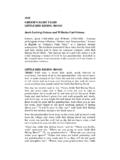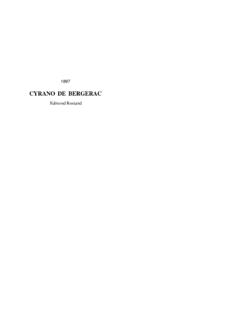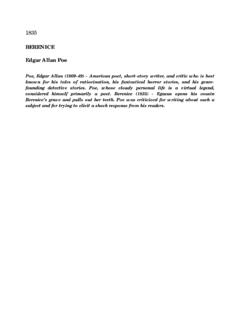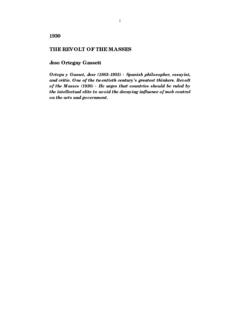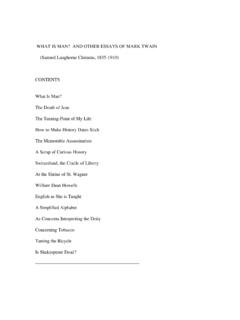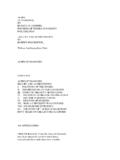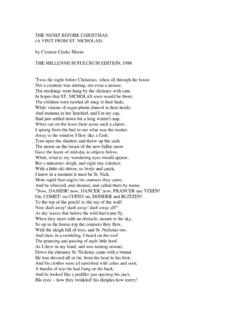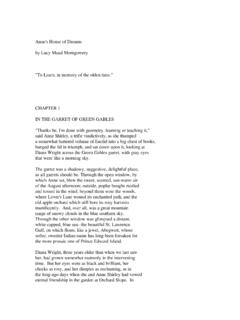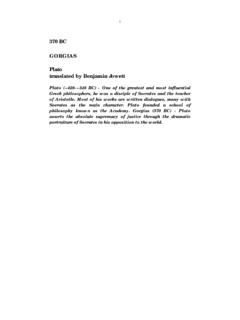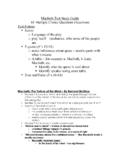Transcription of A SELECTION from the WRITINGS of GUY DE …
1 A SELECTION from the WRITINGS of GUY DE MAUPASSANTSHORT STORIES of the TRAGEDY AND COMEDY OF LIFEWITH A CRITICAL PREFACE BY PAUL BOURGET of the French AcademyAND AN INTRODUCTION BY ROBERT ARNOT, I {of III ??}TABLE OF CONTENTS.[*]VOLUME MADEMOISELLE FIFI2. AN AFFAIR OF STATE3. THE ARTIST4. THE HORLA5. MISS HARRIET6. THE HOLE7. LOVE8. THE INN9. A FAMILY10. BELLFLOWER11. WHO KNOWS?12. THE DEVIL13. EPIPHANY14. SIMON'S PAPA15. WAITER, A "BOCK"16. THE SEQUEL TO A DIVORCE17. THE MAD WOMAN18. IN VARIOUS ROLES19. THE FALSE GEMS20. COUNTESS SATAN21. THE COLONEL'S IDEAS22. TWO LITTLE SOLDIERS23. GHOSTS24. WAS IT A DREAM?25. THE DIARY OF A MADMAN26. AN UNFORTUNATE LIKENESS27. A COUNTRY EXCURSION[*] At the close of the last volume will be found a complete listof the French Titles of De Maupassant's WRITINGS , with theirEnglish DE MAUPASSANTOf the French writers of romance of the latter part of thenineteenth century no one made a reputation as quickly as did Guyde Maupassant.
2 Not one has preserved that reputation with moreease, not only during life, but in death. None so completelyhides his personality in his glory. In an epoch of the utmostpublicity, in which the most insignificant deeds of a celebratedman are spied, recorded, and commented on, the author of "Boulede Suif," of "Pierre et Jean," of "Notre Coeur," found a way ofeffacing his personality in his De Maupassant we know that he was born in Normandy about 1850;that he was the favorite pupil, if one may so express it, theliterary protege, of Gustave Flaubert; that he made his debutlate in 1880, with a novel inserted in a small collection,published by Emile Zola and his young friends, under the title:"The Soirees of Medan"; that subsequently he did not fail topublish stories and romances every year up to 1891, when adisease of the brain struck him down in the fullness ofproduction.
3 And that he died, finally, in 1893, without havingrecovered his know, too, that he passionately loved a strenuous physicallife and long journeys, particularly long journeys upon the owned a little sailing yacht, named after one of his books,"Bel-Ami," in which he used to sojourn for weeks and meager details are almost the only ones that have beengathered as food for the curiosity of the leave the legendary side, which is always in evidence in thecase of a celebrated man,--that gossip, for example, which aversthat Maupassant was a high liver and a worldling. The very numberof his volumes is a protest to the contrary. One could not writeso large a number of pages in so small a number of years withoutthe virtue of industry, a virtue incompatible with habits ofdissipation. This does not mean that the writer of these greatromances had no love for pleasure and had not tasted the world,but that for him these were secondary things.
4 The psychology ofhis work ought, then, to find an interpretation other than thatafforded by wholly false or exaggerated anecdotes. I wish toindicate here how this work, illumined by the three or fourpositive data which I have given, appears to me to demand first, what does that anxiety to conceal his personalityprove, carried as it was to such an extreme degree? The answerrises spontaneously in the minds of those who have studiedclosely the history of literature. The absolute silence abouthimself, preserved by one whose position among us was that of aTourgenief, or of a Merimee, and of a Moliere or a Shakespeareamong the classic great, reveals, to a person of instinct, anervous sensibility of extreme depth. There are many chances foran artist of his kind, however timid, or for one who has somegrief, to show the depth of his emotion. To take up again onlytwo of the names just cited, this was the case with the author of"Terres Vierges," and with the writer of "Colomba.
5 "A somewhat minute analysis of the novels and romances ofMaupassant would suffice to demonstrate, even if we did not knowthe nature of the incidents which prompted them, that he alsosuffered from an excess of nervous emotionalism. Nine times outof ten, what is the subject of these stories to which freedom ofstyle gives the appearance of health? A tragic episode. I cite,at random, "Mademoiselle Fifi," "La Petite Roque," "InutileBeaute," "Le Masque," "Le Horla," "L'Epreuve," "Le Champd'Oliviers," among the novels, and among the romances, "Une Vie,""Pierre et Jean," "Fort comme la Mort," "Notre Coeur." Hisimagination aims to represent the human being as imprisoned in asituation at once insupportable and inevitable. The spell of thisgrief and trouble exerts such a power upon the writer that heends stories commenced in pleasantry with some sinister me instance "Saint-Antonin," "A Midnight Revel," "The LittleCask," and "Old Amable.
6 " You close the book at the end of thesevigorous sketches, and feel how surely they point to constantsuffering on the part of him who executed is the leading trait in the literary physiognomy ofMaupassant, as it is the leading and most profound trait in thepsychology of his work, viz, that human life is a snare laid bynature, where joy is always changed to misery, where noble wordsand the highest professions of faith serve the lowest plans andthe most cruel egoism, where chagrin, crime, and folly areforever on hand to pursue implacably our hopes, nullify ourvirtues, and annihilate our wisdom. But this is not the has been called a literary nihilist--but (and this isthe second trait of his singular genius) in him nihilism findsitself coexistent with an animal energy so fresh and so intensethat for a long time it deceives the closest observer.
7 In aneloquent discourse, pronounced over his premature grave, EmileZola well defined this illusion: "We congratulated him," said he,"upon that health which seemed unbreakable, and justly creditedhim with the soundest constitution of our band, as well as withthe clearest mind and the sanest reason. It was then that thisfrightful thunderbolt destroyed him."It is not exact to say that the lofty genius of De Maupassant wasthat of an absolutely sane man. We comprehend it to-day, and, onre-reading him, we find traces everywhere of his final it is exact to say that this wounded genius was, by asingular circumstance, the genius of a robust man. A physiologistwould without doubt explain this anomaly by the coexistence of anervous lesion, light at first, with a muscular, athletictemperament. Whatever the cause, the effect is undeniable. Theskilled and dainty pessimism of De Maupassant was accompanied bya vigor and physique very unusual.
8 His sensations are in turnthose of a hunter and of a sailor, who have, as the old Frenchsaying expressively puts it, "swift foot, eagle eye," and who areattuned to all the whisperings of only confidences that he has ever permitted his pen to tellof the intoxication of a free, animal existence are in theopening pages of the story entitled "Mouche," where he recalls,among the sweetest memories of his youth, his rollicking canoeparties upon the Seine, and in the description in "La VieErrante" of a night spent on the sea,--"to be alone upon thewater under the sky, through a warm night,"--in which he speaksof the happiness of those "who receive sensations through thewhole surface of their flesh, as they do through their eyes,their mouth, their ears, and sense of smell."His unique and too scanty collection of verses, written in earlyyouth, contains the two most fearless, I was going to say themost ingenuous, paeans, perhaps, that have been written since theRenaissance: "At the Water's Edge" (Au Bord de l'Eau) and the"Rustic Venus" (La Venus Rustique).
9 But here is a paganism whoseardor, by a contrast which brings up the ever present duality ofhis nature, ends in an inexpressible shiver of scorn: "We look at each other, astonished, immovable, And both are so pale that it makes us fear." * * * * * * *"Alas! through all our senses slips life itself away."This ending of the "Water's Edge" is less sinister than themurder and the vision of horror which terminate the pantheistichymn of the "Rustic Venus." Considered as documents revealing thecast of mind of him who composed them, these two lyrical essaysare especially significant, since they were spontaneous. Theyexplain why De Maupassant, in the early years of production,voluntarily chose, as the heroes of his stories, creatures verynear to primitive existence, peasants, sailors, poachers, girlsof the farm, and the source of the vigor with which he describesthese rude figures.
10 The robustness of his animalism permits himfully to imagine all the simple sensations of these beings, whilehis pessimism, which tinges these sketches of brutal customs withan element of delicate scorn, preserves him from coarseness. Itis this constant and involuntary antithesis which gives uniquevalue to those Norman scenes which have contributed so much tohis glory. It corresponds to, those two contradictory tendenciesin literary art, which seek always to render life in motion withthe most intense coloring, and still to make more and more subtlethe impression of this life. How is one ambition to be satisfiedat the same time as the other, since all gain in color andmovement brings about a diminution of sensibility, andconversely? The paradox of his constitution permitted toMaupassant this seemingly impossible accord, aided as he was byan intellect whose influence was all powerful upon hisdevelopment--the writer I mention above, Gustave meetings of a pupil and a master, both great, are indeedrare.
